Overview
Understanding the equation for operating income is essential for grasping a business's profitability from its core operations. This calculation, which involves total revenue minus the costs of goods sold and operating expenses, is particularly significant for independent workers and small business owners. It serves as a vital tool for assessing operational efficiency and making informed financial decisions. In today's evolving freelance economy, where effective expense management is crucial for success, recognizing the importance of operating income can empower individuals to navigate their financial landscapes more confidently.
Introduction
In the dynamic realm of freelancing and small business ownership, understanding financial metrics is essential for achieving success. Operating income emerges as a pivotal indicator of profitability, reflecting the earnings generated from core business activities while excluding extraneous costs such as taxes and interest. As the freelance workforce continues to expand—projected to constitute over half of the U.S. labor market by 2027—the importance of this metric becomes increasingly evident.
By mastering the calculation and implications of operating income, freelancers can make informed decisions that enhance their financial health and operational efficiency. This article explores the intricacies of operating income, offering insights into its calculation, its significance in financial analysis, and strategies for effective expense management.
Furthermore, it highlights how innovative tools like Kulud can streamline the process for busy professionals, ensuring that understanding and managing finances becomes a more accessible task.
Defining Operating Income: A Key Financial Metric
Earnings from operations, derived from the equation for operating income, serve as a crucial economic measure indicating the profit generated from a company's primary business activities after accounting for operational costs. These expenses include costs directly associated with the production of goods or services, such as wages, rent, and utilities. Unlike net income, which encompasses all expenses including taxes and interest, the equation for operating income focuses specifically on the profitability of core activities.
This distinction is particularly significant for independent contractors and small business owners, as it provides clearer insights into operational efficiency and profitability, thereby facilitating informed financial decision-making.
As we look ahead to 2025, the landscape for independent workers is changing, with projections suggesting they will constitute 50.9% of the U.S. workforce by 2027. This shift underscores the growing importance of understanding earnings for independent workers, who often juggle multiple revenue streams and expenses. Notably, the independent workforce is diverse, with 52.3% of individuals working independently being women and 47.7% being men.
For instance, a freelancer managing several projects must accurately assess their revenue to determine which services yield the highest profitability, thus informing their business strategy.
Real-world examples illustrate the impact of earnings on small business profitability. Consider a freelance graphic designer who incurs substantial costs for software subscriptions and marketing. By applying the equation for operating income, they can ascertain whether their pricing structure sufficiently covers these expenses and contributes to sustainable profit margins.
This analytical approach not only supports financial health but also enhances communication with accountants, as evidenced by testimonials from users of expense management platforms like Kulud. Georgi Knyazhev, an independent worker, noted, "Instead of spending 3 hours each month searching for and collecting invoices for my companies in Estonia, I now spend just 5 minutes. It's a huge time saver."
This highlights how Kulud's automated expense management transforms bookkeeping from hours to minutes, allowing independent workers to focus on their primary business activities.
Recent data indicates that profit is increasingly recognized as a vital performance measure among independent workers. As of 2025, grasping this metric is essential for navigating the complexities of freelance work, particularly in low-income economies where freelancing is often a necessity. The ability to distinguish between operational revenue and net profit empowers independent workers to make strategic choices that can significantly influence their equation for operating income.
As emphasized in a case study, the economic necessity driving freelance work in these regions underscores the importance of monetary indicators such as profit.
Professional insights further underscore the significance of earnings for independent workers. Dr. Angelia Cline, Ed.D., asserts that it serves as a benchmark for assessing business performance and implementing adjustments to enhance profitability. By focusing on the equation for operating income, independent workers can refine their processes, minimize unnecessary costs, and ultimately improve their economic outcomes.
This focus is essential in a competitive environment where the percentage of non-freelancers considering freelancing rose from 13% to 17% between 2020 and 2022, indicating an increasing interest in this flexible work model.
In summary, the equation for operating income is not merely a figure; it is a critical indicator of economic well-being for independent workers and small business owners alike. By understanding and leveraging this metric, they can navigate their economic landscape more effectively, ensuring their businesses thrive in an increasingly freelance-driven economy. With tools like Kulud, which allows users to easily request missing invoices and automate bank transaction matching, independent workers can enhance their operational efficiency and concentrate on what truly matters—their creative work.
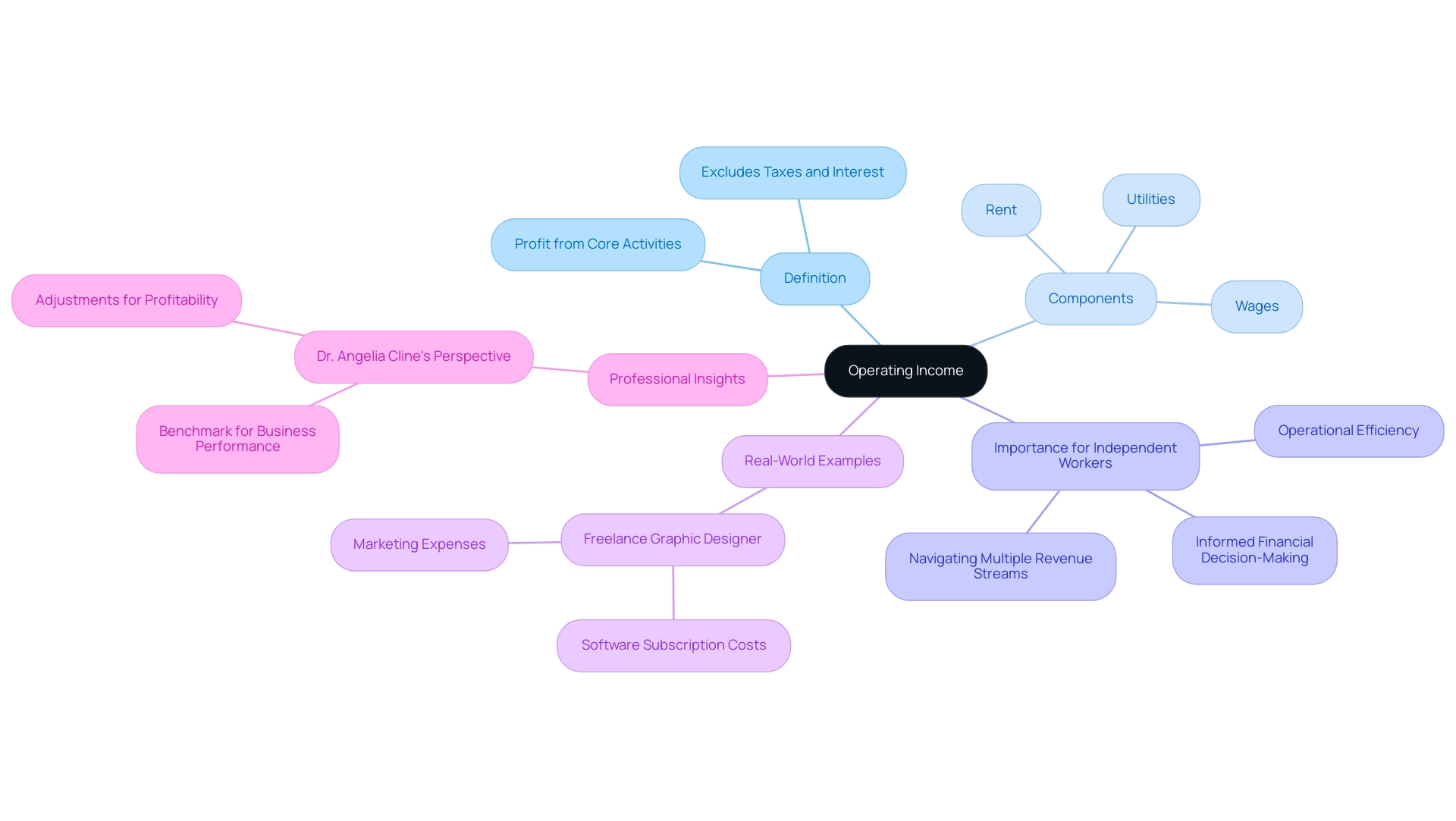
How to Calculate Operating Income: Step-by-Step Guide
Determining operating profit is crucial for independent workers and small business proprietors to comprehend their financial well-being. Here’s a step-by-step guide to help you through the process:
-
Determine Total Revenue: This figure represents the total income generated from the sale of goods or services.
For instance, if a self-employed individual earns $100,000 from their projects, this amount will be your starting point.
-
Subtract Cost of Goods Sold (COGS): COGS includes all direct costs associated with producing the goods or services sold. For example, if the contractor incurs $30,000 in costs related to materials or subcontractors, this amount should be deducted from the total revenue.
-
Deduct Operating Expenses: These are the indirect costs necessary to run the business, such as salaries, rent, utilities, and other overheads. If the independent contractor has $20,000 in business expenses, this will also be deducted.
The equation for determining operational profit can be summarized as follows:
Operational Profit = Total Revenue - COGS - Business Expenses
Using the earlier example, if an independent contractor has $100,000 in revenue, $30,000 in COGS, and $20,000 in business expenses, their operational profit would be:
Operational Profit = $100,000 - $30,000 - $20,000 = $50,000
Grasping operational profit is essential, as it offers insight into the profitability of your core business activities. In 2025, the average operational earnings for independent contractors is anticipated to mirror the rising demand for freelance services, with data from Statistics Finland showing a substantial boost in economic performance metrics.
Furthermore, case studies suggest that stringent quality assurance in monetary data processing, like those utilized by the Finnish Tax Administration, improves the dependability of economic statistics. This means that reported data accurately reflects the economic status of enterprises, including freelancers, and underscores the importance of precise calculations in budget planning.
As you navigate your economic landscape, remember that operating income is distinct from net income, as it does not account for debt interest, income taxes, capital spending, or depreciation and amortization. This distinction is essential for making informed business decisions and evaluating your economic performance effectively.
Additionally, utilizing Kulud's automated expense management platform can significantly streamline your bookkeeping process. With features like automated receipt processing, automated categorization of expenses, and the ability to analyze previous emails for receipts, Kulud transforms what used to take hours into mere minutes. You can also easily export reports in PDF format, simplifying your expense tracking. As Georgia Knyazhev noted, effective expense management can enhance communication with accountants and ensure that your data is accurate and up-to-date, ultimately supporting better decision-making and economic health.
Furthermore, Kulud has successfully passed security assessments, ensuring a high level of reliability and safety for users.
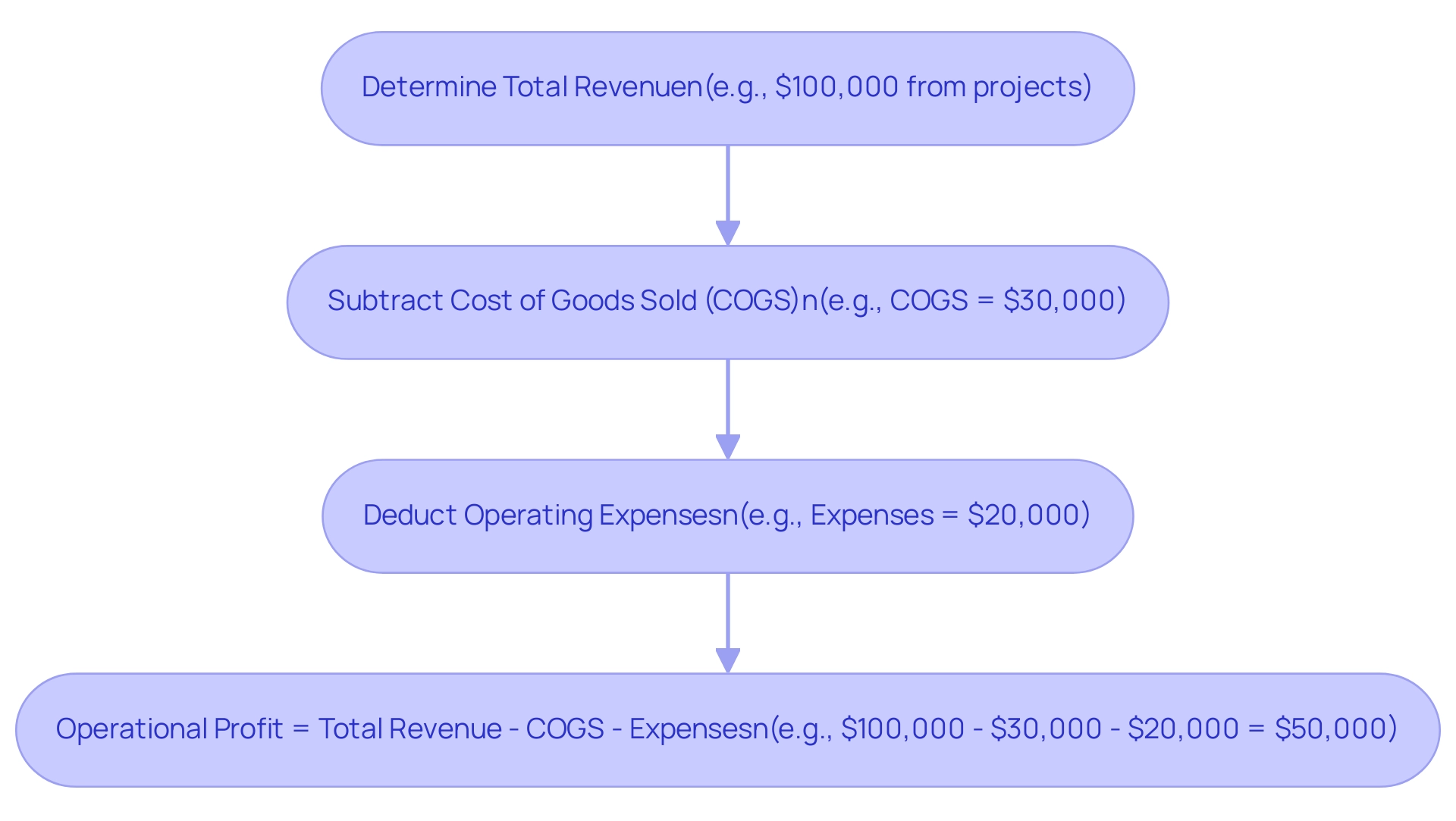
The Importance of Operating Income in Financial Analysis
The equation for operating income is a crucial indicator of a company's economic well-being, providing valuable insights into the effectiveness of its core operations while excluding the impacts of financing and tax strategies. For freelancers and small business proprietors, closely tracking revenue is essential, as it can reveal trends in profitability and operational effectiveness. In 2025, the significance of the equation for operating income in monetary assessment is highlighted by the fact that a steady rise often indicates efficient cost management and revenue growth.
On the other hand, a decrease in earnings may suggest the need for strategic changes to improve business performance. Statistical data published in September 2025 shows that small enterprises are increasingly acknowledging the importance of operating profit in their economic evaluations. This trend is especially pertinent as 80% of organizations reported experiencing actual or attempted fraud attacks in 2023, highlighting the need for strong oversight. The equation for operating income not only reflects a business's ability to generate sustainable profits but also serves as a critical metric for investors and stakeholders evaluating potential investments.
For instance, case studies from the 2024 AFP Payments Fraud and Control Survey demonstrate how revenue can influence monetary decision-making. Organizations that effectively monitored their equation for operating income were better positioned to recover from fraud incidents, with 40% detecting fraud within a week. This emphasizes the significance of timely economic analysis in protecting business health. Furthermore, the survey found that 30% of organizations could not recover funds lost to fraud, underscoring the critical need for effective resource management.
User testimonials from Kulud reinforce the transformative impact of effective money management. Emily J., a tax consultant, shared that "Kulud has transformed how I work with clients. I spend less time on admin tasks and more time adding value to their businesses."
Similarly, Thomas H. noted, "Matching invoices with transactions used to take hours. With Kulud, it's automated and accurate, saving me and my clients so much time." Kulud's features, such as automated invoice retrieval and bank transaction matching, streamline bookkeeping processes, allowing freelancers to concentrate on their core operations while maintaining a clear understanding of their monetary status.
Additionally, with pricing starting at €0.15 per invoice after the first 50 invoices processed monthly, Kulud offers a cost-effective solution for managing expenses. As the landscape of financial management changes, with FP&A teams emphasizing scenario planning and predictive analytics, the equation for operating income remains crucial in financial analysis, offering a clear view of a business's health and directing strategic planning.
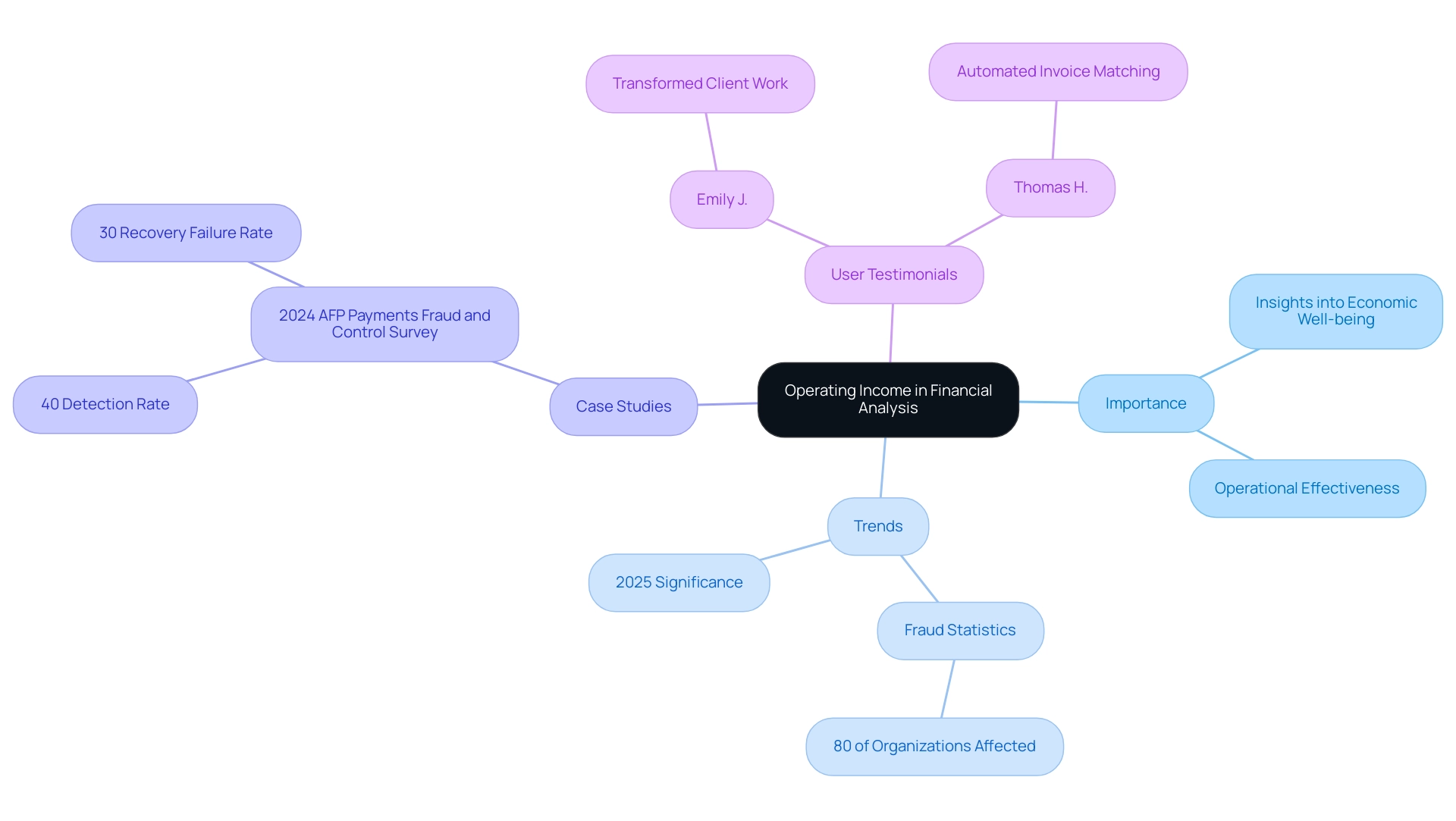
Leveraging Operating Income for Effective Expense Management
Freelancers and small business proprietors often face significant challenges in managing their expenses effectively. By regularly calculating and analyzing their operating income, they can identify opportunities to reduce costs without sacrificing quality. For instance, utilizing an expense management platform like Kulud automates the tracking and categorization of expenses. This includes automated extraction and categorization, allowing users to focus on their core business activities.
Kulud's features, such as automated invoice matching with bank transactions and the ability to easily request missing invoices, not only save valuable time but also ensure that all expenses are meticulously recorded. This leads to more accurate calculations of income.
As we look ahead to 2025, the landscape for independent workers is evolving, with many leveraging advanced expense management tools to streamline their financial processes. Statistics reveal that a growing number of independent workers are turning to technology for financial management, with platforms like Kulud at the forefront of simplifying expense tracking. By maintaining a clear perspective on their earnings, businesses can make informed strategic decisions that enhance their performance.
Moreover, expert insights underscore the critical role of technology in managing earnings. Victor Domingos, CFO, points out that finance will increasingly guide business innovation and decision-making, particularly through the use of technology to analyze and predict trends. This shift emphasizes the necessity for independent workers to adopt expense management systems like Kulud, which not only enhance efficiency but also provide a comprehensive view of their financial health.
The benefits of monitoring revenue, including the equation for operating income, extend beyond basic calculations; they facilitate improved fiscal planning and stability, essential for navigating the inherent income fluctuations in independent work. With approximately 80% of the workforce in low-income economies engaged in freelance work, the demand for effective expense management tools is more urgent than ever. Case studies indicate that independent workers who actively manage their operating income report lower stress levels and greater job satisfaction, highlighting the importance of financial stability in the gig economy.
By integrating these strategies and utilizing Kulud's automated solutions, including the ability to export reports in PDF format, independent workers can position themselves to thrive in an increasingly competitive environment.
Additionally, recognizing the diverse nature of self-employment—where skills such as data entry, copywriting, and graphic design are commonly registered, while higher-earning categories include design, game development, and coding—can assist independent workers in customizing their management strategies to meet their specific needs. Furthermore, Kulud has successfully completed security assessments, providing users with reassurance regarding the safety of their financial data.
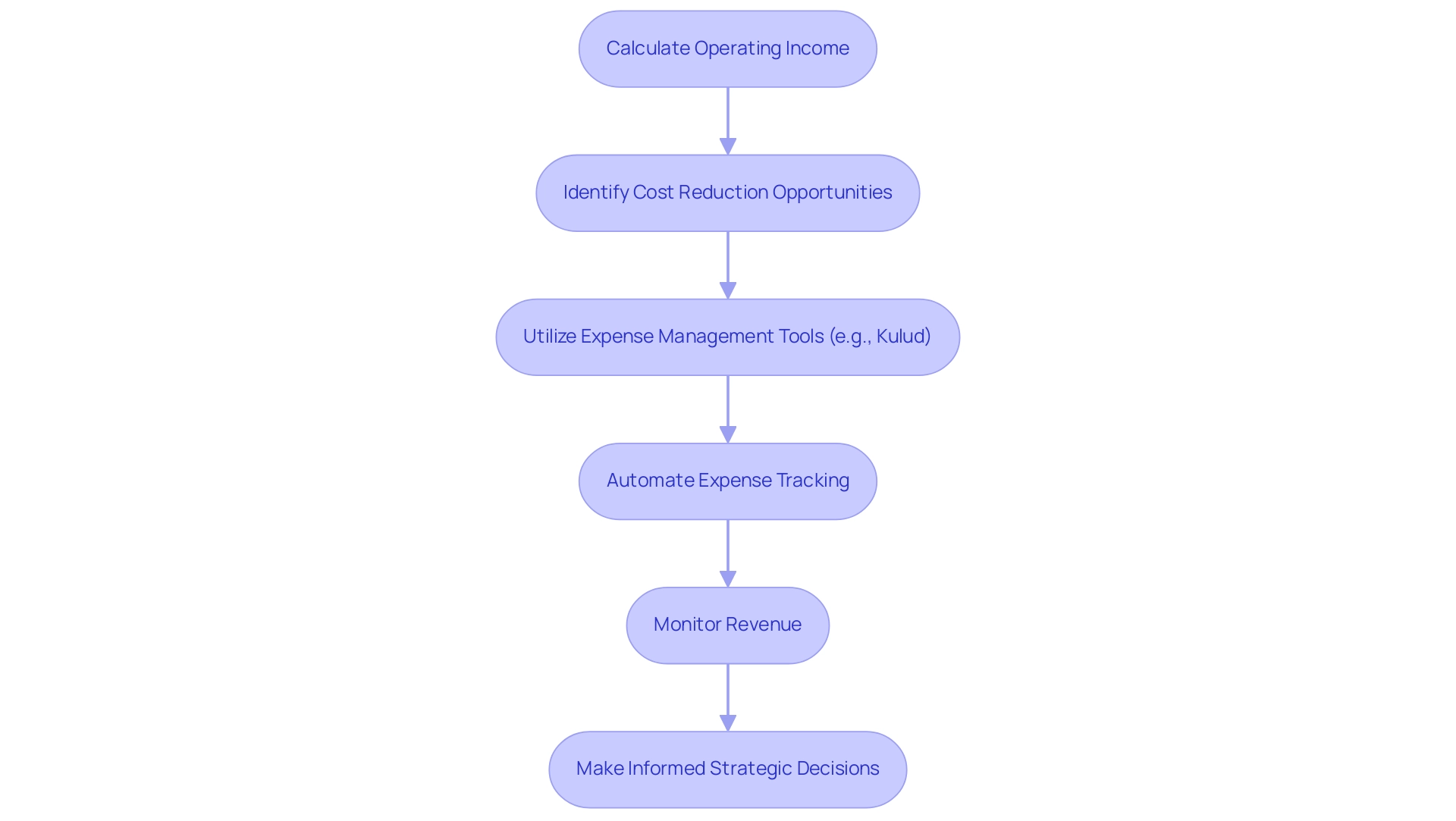
Challenges in Managing Operating Income and Solutions
Managing the equation for operating income presents significant challenges for independent workers and small business owners, particularly in 2025. Common issues include fluctuating revenues, unexpected expenses, and the complexities of accurately tracking costs. In fact, 32% of senior-level leaders cite the complexity of the current environment as a major challenge to digital transformation. This underscores the difficulties independent workers face in managing their finances.
To navigate these hurdles effectively, businesses can adopt several strategic approaches. Regular fiscal reviews, conducted monthly or quarterly, allow businesses to identify trends, monitor performance, and pinpoint areas needing improvement. Establishing a budget aligned with business objectives provides a structured framework for managing expenses, helping to mitigate the impact of unforeseen costs.
Furthermore, utilizing technology can significantly streamline expense tracking and reporting. Implementing advanced tools like Kulud transforms how independent workers and small business owners manage their finances by automating the process of finding, extracting, and categorizing receipts and invoices. This includes automated categorization, which boosts efficiency by decreasing the time dedicated to manual bookkeeping from hours to just minutes, while centralizing invoices, receipts, and transactions for a complete overview of data.
In addition to this, Kulud can retroactively analyze previous emails to identify and extract receipt information, further simplifying the expense management process. User testimonials emphasize how Kulud's advanced encryption and successful completion of the Cloud Application Security Assessment (CASA) ensure that sensitive monetary information remains protected. This allows independent workers to concentrate on growth rather than administrative tasks. As highlighted in a case study, Kulud effectively tackles the specific challenges independent workers encounter, enabling them to sustain a healthy revenue stream.
Moreover, the significance of efficient money management is underscored by the reality that 24% of finance experts intend to switch jobs within a year, suggesting a demand for skilled individuals in the sector. The growing emphasis on sustainability in business strategies, as seen in the circular economy, is becoming increasingly relevant for freelancers and small business owners in managing their equation for operating income. By proactively addressing these challenges with the help of Kulud, freelancers and small business owners can maintain a healthy operating income, ensuring long-term financial stability and success in an increasingly complex economic landscape.
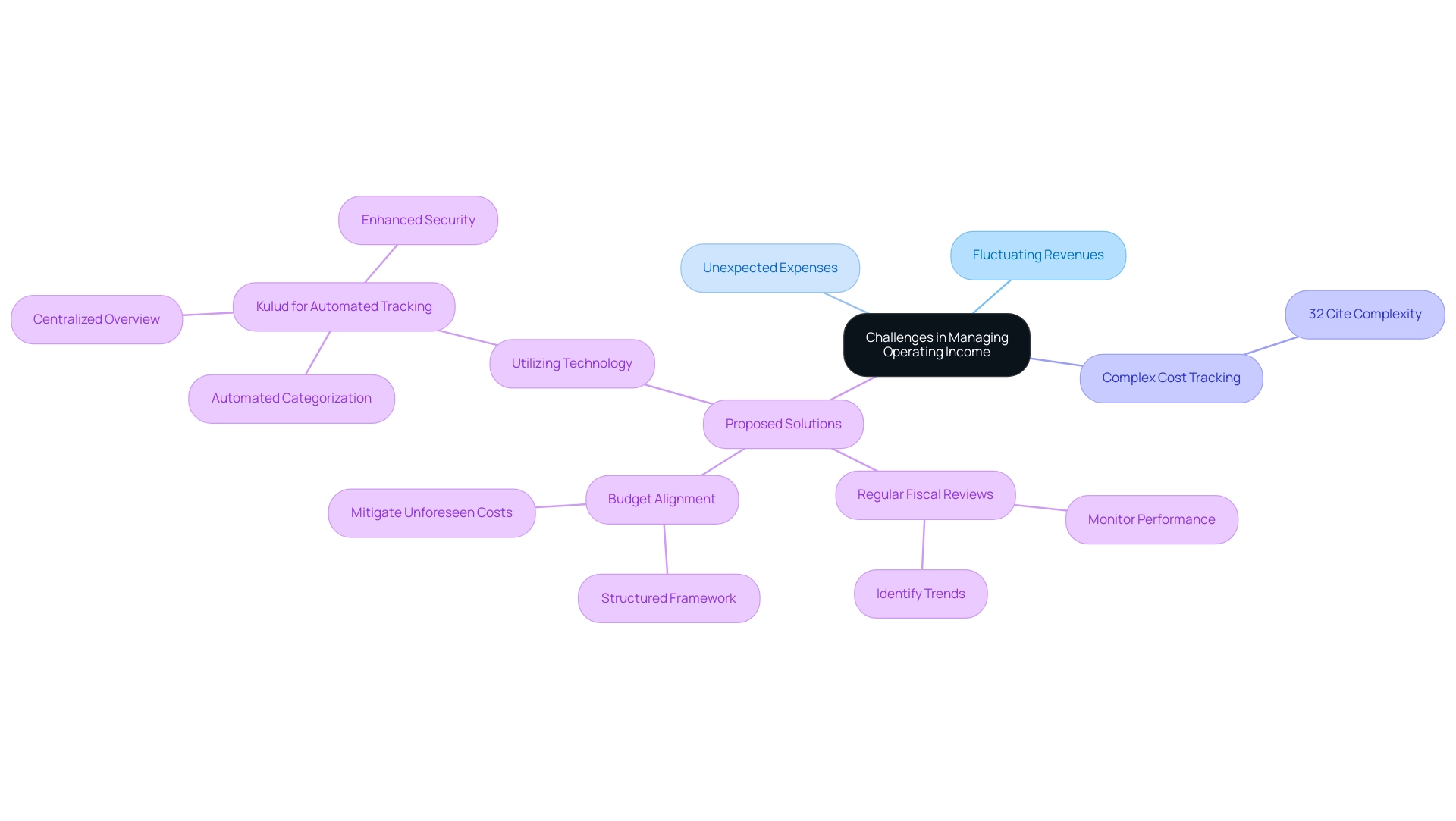
Conclusion
Mastering the concept of operating income is essential for freelancers and small business owners striving for financial success. This key financial metric not only reflects the profitability of core business activities but also serves as a guide for making informed decisions. By understanding how to calculate operating income and recognizing its significance in financial analysis, freelancers can gain valuable insights into their operational efficiency and overall business health.
Utilizing innovative tools like Kulud enhances the ability to manage expenses effectively. By automating tedious bookkeeping tasks, freelancers can focus on what truly matters—growing their businesses and maintaining financial stability. As the freelance landscape continues to evolve, the adoption of technology in financial management will be crucial for navigating challenges such as fluctuating revenues and unexpected expenses.
In an era where freelancing is projected to dominate the workforce, understanding and leveraging operating income becomes increasingly vital. By regularly reviewing financial performance and adopting strategic expense management practices, freelancers can not only enhance their financial health but also position themselves for long-term success in a competitive environment. Embracing these practices ensures that freelancers are well-equipped to thrive, making operating income a cornerstone of their financial strategy.



